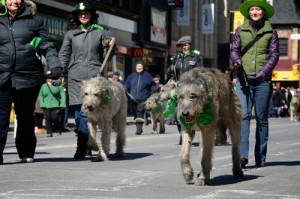 Irish or not, there are a few aspects associated with St. Patrick’s Day that are tried and true; drinking copious amounts of Guinness, eating large quantities of corned beef, cabbage and potatoes and wearing the color green. While it is easy to get swept up in the fun and frivolity of the day’s events, there are some aspects a dog should avoid.
Irish or not, there are a few aspects associated with St. Patrick’s Day that are tried and true; drinking copious amounts of Guinness, eating large quantities of corned beef, cabbage and potatoes and wearing the color green. While it is easy to get swept up in the fun and frivolity of the day’s events, there are some aspects a dog should avoid.
Drinking
Alcohol, even beer can be poisonous to dogs, even in small amounts. A dogs liver is smaller than a human’s and would have a harder time processing any amount of alcohol. In addition to causing liver damage, alcohol may cause brain damage or cardiac arrest.
Eating corned beef
Curing a brisket in a briny solution and simmering it with spices, corned beef is a traditional part of St. Patrick’s day. A three ounce serving of corned beef is 250 calories with a hefty 16g. Fatty foods could lead to obesity and heart disease. Instead of corned beef, serve your dog a heaping pile of Colcannon (boiled potatoes and Cabbage). Not only is potatoes and cabbage healthier for them, it will also be easier for them to digest.
Green dye
A well known tradition is to dye food, drinks and even hair green in celebration of March 17th. Commercial food coloring may cause severe stomach upset or an allergic reaction. It is best to avoid dyed food all together. If an owner is adamant about dyeing their dog’s coat, use a drink mix or hair chalk. Both are temporary, easy to wash off and less caustic than other means of fur coloring. Commercial hair dyes may cause severe allergic reaction to a dog’s sensitive skin.
Parades
Parades are fun, festive and a great way to socialize, for humans. To a dog it is a mass of legs and feet, the possibility of getting crushed in a throng, and loud noises coming out of nowhere. Even the most laid back dog can get a bit overwhelmed. It is best to keep the dog at home and take her for a long romp after the parade.
Shamrocks
Those lucky clovers may not be so fortunate for some dogs. Shamrocks contain dangerous toxins that may be poisonous if ingested. If a dog consumes the noxious plants watch for signs of lethargy, excessive drooling, tremors or blood in the urine. If any symptoms appear take the dog to the vet or call the ASPCA animal poison control hotline.
 Irish or not, there are a few aspects associated with St. Patrick’s Day that are tried and true; drinking copious amounts of Guinness, eating large quantities of corned beef, cabbage and potatoes and wearing the color green. While it is easy to get swept up in the fun and frivolity of the day’s events, there are some aspects a dog should avoid.
Irish or not, there are a few aspects associated with St. Patrick’s Day that are tried and true; drinking copious amounts of Guinness, eating large quantities of corned beef, cabbage and potatoes and wearing the color green. While it is easy to get swept up in the fun and frivolity of the day’s events, there are some aspects a dog should avoid.